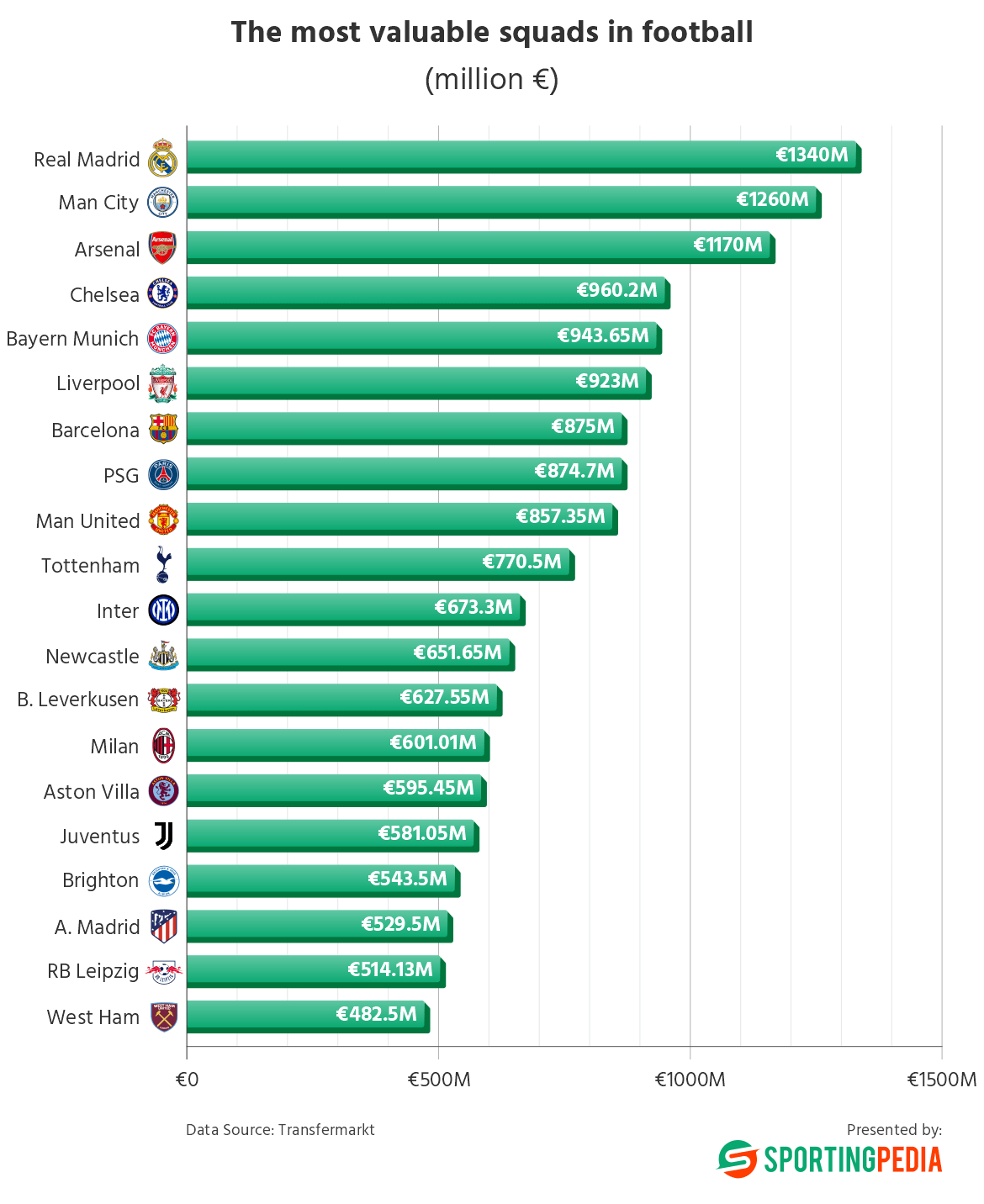The world of football is not only a spectacle of athleticism but also a huge financial battleground where clubs strive to build the most competitive and valuable squads. This summer’s transfer window was marked by Kylian Mbappe’s move to Real Madrid and concluded with Atletico Madrid making Julian Alvarez the most expensive signing of 2024. With a mix of strategic signings, free transfers, and savvy market maneuvers, clubs across the continent have reshaped their squads and, consequently, their market values. This Sportingpedia report delves into the most valuable football squads, examining how recent transfers and management decisions have shaped the rankings.
Despite not paying a transfer fee for Kylian Mbappe, Real Madrid’s acquisition of the French star is widely regarded as the biggest transfer of the 2024 summer. This move, coupled with the arrival of Brazilian prodigy Endrick, has propelled Los Blancos to the top spot, surpassing Manchester City to become the club with the most valuable squad in world football. According to Transfermarkt, Real Madrid’s squad value now stands at an unprecedented €1.34 billion, surpassing Manchester City’s by €80 million. It also reveals that only clubs from Europe’s top 5 leagues make it into the top 20 and that half of the teams in the ranking are part of the English Premier League.
Key Takeaways:
- Only teams from Europe’s top five leagues (Premier League, LaLiga, Serie A, Bundesliga, and Ligue 1) are present within the top 20 most valuable squads
- Real Madrid has overtaken Manchester City as the club with the most valuable squad
- Half of the clubs in the ranking originate from the Premier League, six are within the top 10
- Only three clubs have squads valued at over €1 billion
- Five of the 20 clubs will not participate in the Champions League and they all originate from the Premier League
- No Italian club is represented in the top 10


The concentration of the most valuable squads within Europe’s top five leagues underscores the financial power these leagues hold over the rest of the football world. With all 20 clubs in the top value rankings hailing from these leagues, it is clear that financial might, driven by extensive broadcasting revenues and global fan engagement, remains concentrated in a select few countries.
Only three clubs – Real Madrid, Manchester City, and Arsenal – have assembled squads valued at over €1 billion. This trio represents the pinnacle of financial investment in football, blending substantial resources with strategic talent acquisition. Arsenal’s entry into this elite group signals their resurgence and ambitious plans under Mikel Arteta.
Real Madrid’s rise to the top of the squad value rankings, overtaking Manchester City, showcases their effective strategy in recent transfer windows. Despite not spending on transfer fees for Kylian Mbappe, the addition of the French forward, along with other strategic moves like acquiring Endrick, has significantly boosted the club’s overall market value. Mbappe, along with his new teammates Jude Bellingham, and Vinicius Junior are currently among the most valuable football players globally, each holding a market value of €180 million. Real Madrid also boasts another four players with valuations of €100 million or higher – Federico Valverde, Rodrygo, Eduardo Camavinga, and Aurelien Tchouameni.
Manchester City, now in second place, has also made adjustments following the sale of Julian Alvarez to Atletico Madrid, a move that slightly impacted their overall squad value. Excluding Erling Haaland, who shares the highest market value in the world with Real Madrid’s trio, City still possesses other high-value players such as Phil Foden and Rodri, who each contribute substantially to the team’s combined market valuation. Arsenal, the third club with a squad valued at over €1 billion, has seen its position strengthened by adding valuable players. The Gunners have multiple footballers worth over €100 million, including Declan Rice, Bukayo Saka, and Martin Odegaard. These players, alongside the recent signings of Mikel Merino, Ricardo Calafiori and Raheem Sterling have solidified Arsenal’s financial and competitive standing.
The Premier League’s overwhelming presence in both the top 10 and top 20, with six teams among the top 10 and ten in the top 20, demonstrates its unparalleled financial dominance. This is driven by substantial TV rights deals, sponsorships, and a robust international fan base, which together enable even mid-table clubs to invest heavily in their squads. The inclusion of teams like Newcastle and Brighton alongside the traditional “big six” illustrates the depth of financial strength across the league.
Interestingly, five clubs among the top 20 most valuable squads will not feature in this season’s Champions League and they are all English. This includes Chelsea, Tottenham, Brighton, West Ham, and Newcastle, which, despite their high squad values, did not qualify for Europe’s premier competition. This situation underscores the unpredictable nature of football, where financial investment does not always translate into immediate on-field success. However, it also suggests potential for future breakthroughs, as these clubs continue to build and compete at high levels.
Finally, the absence of any Italian clubs in the top 10 is telling of the broader economic challenges faced by Serie A. Inter, the highest-ranked Italian club, finds itself just outside the top 10, in 11th place. This gap highlights the financial disparity between Serie A and other top European leagues, driven by less lucrative TV deals and sponsorship agreements. Nonetheless, clubs like Inter, Milan, and Juventus continue to maintain competitive squads through strategic planning and targeted investments, reflecting their enduring presence in European football despite financial constraints.
